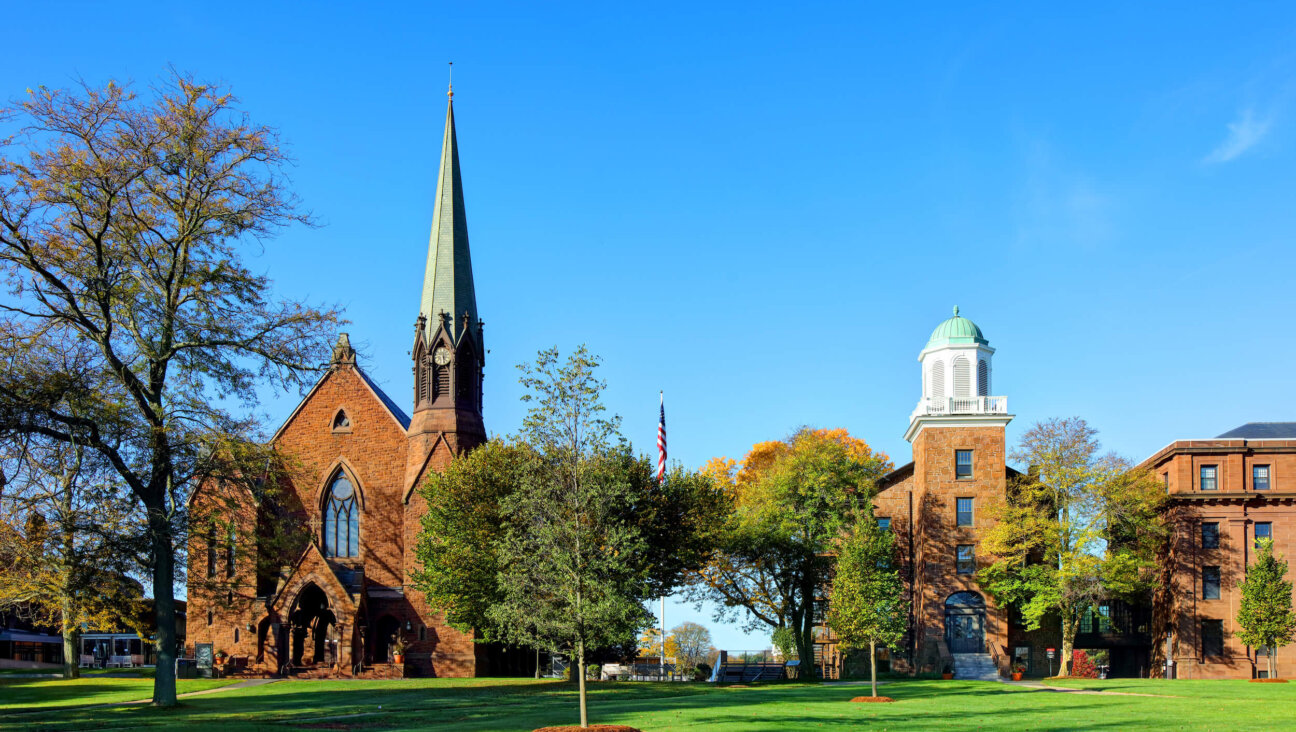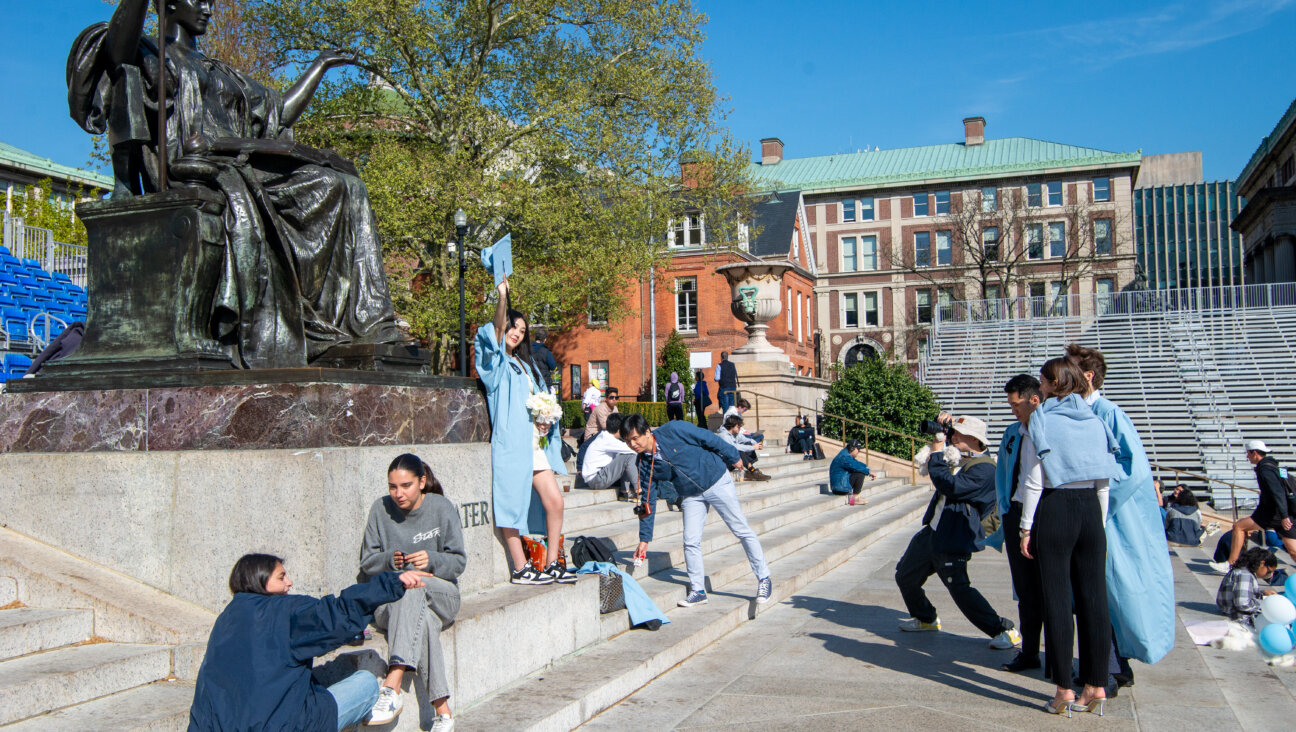The Ugly ‘SNL’ Joke You Missed While Chuckling at ‘Bernie Sanderswitzky’

This one went by so fast that most of us seem to have missed it. This past weekend’s Saturday Night Live had not one but two Jewish jokes. One was moderately funny, notable mainly for the fact that it came from the mouth of Senator Bernie Sanders, during a back-and-forth with his doppelganger Larry David. The other, delivered by Weekend Update fake news co-anchor Michael Che, was far more pointed and may just have crossed a line.
Here’s Che’s bit:
“On his first visit to a U.S. mosque, President Obama called on U.S. television producers to create characters that are not related to issues of national security. Although, Mr. President, if you really want to reach TV producers, say it at a synagogue.”
That last phrase was delivered in a coy stage whisper, as if to signal that he knows he’s being naughty. You can watch the video here. It begins at 2:33 and runs 18 seconds.
Was it bigoted? I posted it to Facebook and posed it as an open question. There were 20 responses from 13 different people. Of them, three thought it was offensive and six thought it was on the mark — “courageous,” “edgy” or simply “funny.” The rest didn’t express an opinion.
Some of the comments were eye-opening. On the pro side, one comment said: “If a Jew said it, it would be OK. If a Black man says it, it’s courageous.” (Che is black.)
On the con side: “Jews controlling Hollywood. What if the stereotype related to Jews controlling banks. Would you equivocate then?” (I think that was directed at me for posing it as an open question.)
And this: “Edgy? Courageous? When was the last time you heard him make a joke about blacks and watermelons? Answer: The next time will be the first.”
Here’s the most interesting critique: “It wasn’t simply another gratuitous reference to the ‘Jews control Hollywood’ trope that could easily be identified as a ‘meta’ commentary on such stereotypes. Rather, the joke was that Muslims are stereotyped on screen because it’s Jews making those decisions — i.e., not individual Jews in the industry, but a Jewish cabal controlling the industry with a ‘Jewish agenda’. For many seeing the bit, that’s the extent of the joke — nudge nudge, wink wink, of COURSE Muslims can’t get a fair shake in Hollywood. The recognition that the stereotyping of one minority is being explained with reference to the stereotyping of another may be too meta a leap for many (most?) viewers to take. The bit could have been saved with a device this Saturday Night Live Weekend Update cast has used on other occasions to tease out a deeper or subtler level of a joke (especially on sensitive issues). Namely, the other anchor — in this case Colin [Jost, who is white] — would explain the joke to the audience by calling out his colleague: ‘So in other words, you’re explaining the stereotyping of Muslims on screen by referencing the age old stereotype that Jews control Hollywood.’ To which Michael, fighting a smile, would reply Exactly’.”
It’s a super-subtle analysis of the joke, but I think it gives the joke writers too much credit. More likely they were simply going for what they hoped would be a belly laugh by referring to the preponderance of Jews in the film and television industry. If you want to reach television producers, they’re not sitting in mosques. They’re sitting in synagogues. Ha ha.
This may or may not be intended as a hint that Jews would be more prejudiced against Muslims than others would be. If it is meant that way, it’s probably not true. As much as the entertainment industry is disproportionately Jewish, it’s also true that Jews — especially Jews in California, and particularly those in the Industry — are disproportionately liberal. And therefore, probably less likely than others to be Islamophobic. It’s true that some of the most visible anti-Muslim rhetoric in the national discourse comes from avowedly Jewish circles, but these tend to be Jewish circles that don’t have much following among Jews at large. Particularly not in Hollywood.
It’s also true that Jews in the entertainment industry are among the least likely to show up in synagogue. If nothing else, therefore, the joke fails on a technicality of Jewish sociology.
But there’s a more basic problem with the back-and-forth. There are indeed large numbers of Jews in the entertainment industry. It might even be fair to say that Jews predominate. That’s certainly the impression of a great many people who work there. Most non-Jews in the industry don’t seem to care one way or the other. But it’s generally understood that talking about it out loud is radioactive. Consider the uproar after the 2013 Oscar ceremonies, when host Seth MacFarlane did a crude “Jews run Hollywood” bit that appalled the audience and won him widespread condemnation. (Here’s that clip.)
JTA publisher (and former Forward managing editor) Ami Eden put together a brief, light-hearted clip at the time that explains what, in his view, distinguishes an offensive Hollywood-Jews joke from an acceptable one. I’m not sure I agree with his conclusions (even though he cites me as an authority, for reasons I’ll explain in a moment), but it’s well worth a watch to see the sorts of things that get said around Tinseltown. Here it is:
Any serious discussion of Jews and Hollywood must begin with the fact that the film industry was literally invented by Jews, as Neal Gabler recounted in his 1988 bestseller, “An Empire of Their Own: How the Jews Invented Hollywood.” It was a gaggle of Jewish immigrant entrepreneurs who saw the commercial possibilities in what had been a novelty gadget, Edison’s movie camera, and turned it into multibillion-dollar industry. The same thing had happened a generation earlier when a group of Jewish entrepreneurs saw the commercial possibilities in Isaac Singer’s sewing machine and turned it into a multibillion-dollar industry of ready-to-wear clothes. Just as a couple of Jewish entrepreneurs, David Sarnoff and William Paley, saw the commercial possibilities in a military gadget, Marconi’s radio transmitter, and created the broadcast industry.
For decades, nearly every studio head in Hollywood was Jewish. The major exceptions were Darryl Zanuck (at 20th Century Fox) and Walt Disney. And Disney’s studio was considered a minor player until it was taken over from Walt’s children in a hostile bid in 1984 by Walt’s nephew Roy E. Disney and a mostly Jewish group of executives headed by Michael Eisner and Jeffrey Katzenberg. They built it into the major force it is today.
The preponderance of Jews in the entertainment industry has always been a touchy subject because of the industry’s enormous impact on the national consciousness. It was a hugely controversial topic in the 1930s, when groups of Christian conservatives accused the Jewish-run industry of corrupting American morals. It remains a popular image among hard-core anti-Semites to this day. Try googling “Jews” and “Hollywood” and see what comes up. (While you’re at it, look at who runs Google.)
The problem is that anti-Semites believe that “the Jews” run Hollywood, meaning there’s some sort of organized Jewish cabal that sets the agenda for America’s public culture. Of course, that’s untrue. Jewish executives in Hollywood are generally unreceptive to pressures from the organized Jewish community. The trick is in the word “the.” Whenever you add the word “the” to the name of a group, you turn it into a description of an organized operation. For example, the French went into Mali to stop the Islamist takeover. Not 60 million French individuals, but French troops, wearing the French uniform, paid for by French tax dollars, dispatched by the government that the French people elected. The French. Similarly, the Chinese are playing a dangerous game with the Americans in the South China Sea. The North Koreans are working on ballistic missiles.
Koreans predominate in dry cleaning in New York City, but The Koreans don’t. There’s no guiding hand, no organized group setting policy. It’s a sociological or demographic observation, not a political one. One might argue that The Jews play a major role in getting foreign aid through Congress, despite its unpopularity, because lobbying and advocacy organizations acting in the name of the Jewish community and paid for by Jewish charity dollars push hard and effectively on the issue. That’s a political observation. But The Jews do not run Hollywood.
Fair enough. Do Jews run Hollywood? Twenty years ago, Marlon Brando was on “Larry King Live,” complaining about the poor image of blacks on screen. And, he said, “Hollywood is run by Jews. It’s owned by Jews. And they should have greater sensitivity about people who are suffering.” (Here’s the clip — courtesy of some anti-Semitic fringe group, of course.) He was immediately condemned as an anti-Semite, and promptly apologized in tears for what he supposed was an inexplicable mental lapse.
But it wasn’t really a lapse. He didn’t say “the Jews” control Hollywood. He said “Jews” do. He was arguing that given the large number of Jews in leadership roles in the film industry — and given the liberal traditions and sensitivity to historic injustice that are so common among Jews — he would have expected greater sensitivity on this sore issue.
As it happens, just a year earlier a huge battle had taken place in Hollywood, after the Bronfman family bought Universal Pictures and its parent company, MCA. At issue was whether the studio’s top executives, chairman Lew Wasserman and president Sidney Sheinberg, would keep their jobs in the takeover. In the middle of the months-long hubbub, the New York Times ran a useful chart on the front page of its Business section, showing the top 10 studios in Hollywood and the two top executives at each. Of the 20 persons named, one was a gentile. I checked.
Today, two decades after Brando’s gaffe, talking about Jews running Hollywood is more common than ever, as Ami Eden notes. Ironically, it’s less true than ever. The top six or seven studios (down from 10 through mergers and decline) have a smaller proportion of Jewish executives than they did back then. By my count, the senior positions — from corporate CEO down to studio chief — seem to have declined from 90% Jewish to about half. Looking further down to positions like production executives, there’s even more diversity.
There’s an interesting discussion thread on the Quora website in which readers, apparently including a number of industry people, weigh in on whether or not Hollywood is controlled by individuals who are Jewish. One reader points out that the most important measure of control in Hollywood is the ability to “greenlight” a project by one’s personal say-so, and that belongs to a select group that includes studio executives, A-list actors and powerful directors and screenwriters. And there the list includes more non-Jews than Jews — think Ben Affleck, Angelina Jolie, Martin Scorsese and Quentin Tarantino along with Steven Spielberg and Jeffrey Katzenberg.
So if it’s less true, why is it so much more openly bandied about? I think there are several reasons. One is that Jews today are widely considered to be part of the American elite rather than the downtrodden outsiders they once were. One-tenth of the Senate. One-third of the Supreme Court. And with that easy access, combined with the growing distance of the Holocaust, comes a widespread sense that Jews are no longer a vulnerable group needing or deserving protection. That’s why watermelon jokes are not OK but Jewish Hollywood jokes seem to be. Jewish comics poke fun in public — think Jon Stewart and Sarah Silverman — in ways that earlier generations of Jewish comics did not, unless they were doing it in private, meaning at Grossinger’s. Good manners — some call it political correctness — dictates that you not tread on the sensitivities of the vulnerable. The powerful are fair game.
There are other factors in the growing acceptability of these Jewish jokes, including a sea-change in the Jewish role in American public life in the decade since the Iraq War. But that’s a topic for another day.
By the way, the Bernie Sanders joke on Saturday Night Live can be seen here, beginning at 2:11. The set-up: Larry David is a rich passenger on the Titanic who objects to women and children getting first access to the lifeboats. Sanders shows up in worker’s garb and says he’s tired of the one percent getting preferential treatment. David asks him who he is.
Sanders: I am Bernie Sanderswitzky. But we’re gonna change it when we get to America so it doesn’t sound quite so Jewish.
David: Yeah. That’ll trick ‘em.

I hope you appreciated this article. Before you go, I’d like to ask you to please support the Forward’s award-winning journalism this Passover.
In this age of misinformation, our work is needed like never before. We report on the news that matters most to American Jews, driven by truth, not ideology.
At a time when newsrooms are closing or cutting back, the Forward has removed its paywall. That means for the first time in our 126-year history, Forward journalism is free to everyone, everywhere. With an ongoing war, rising antisemitism, and a flood of disinformation that may affect the upcoming election, we believe that free and open access to Jewish journalism is imperative.
Readers like you make it all possible. Right now, we’re in the middle of our Passover Pledge Drive and we still need 300 people to step up and make a gift to sustain our trustworthy, independent journalism.
Make a gift of any size and become a Forward member today. You’ll support our mission to tell the American Jewish story fully and fairly.
— Rachel Fishman Feddersen, Publisher and CEO
Join our mission to tell the Jewish story fully and fairly.
Only 300 more gifts needed by April 30























